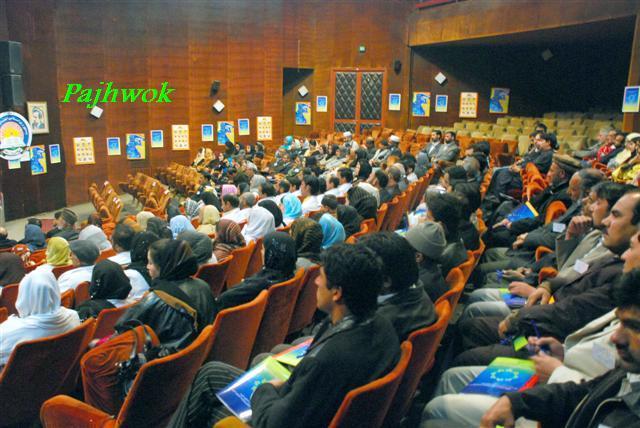KABUL, the lower house remained inefficient during last term but the new souse had a chance for improvement.
Aziz Ahmad Fanus, lecturer in Journalism faculty ofKabulUniversitysaid two essential factors behind the failure of a good parliament inAfghanistanwere, firstly the country had provided with better facilities to the Parliament and secondly, the country was unable to pay millions of dollars for formation of parliament.
According to Fanus, the Parliament was unable to deliver as it failed to represent Afghans, legislate and omit in government affairs.
Mentioning the conflicts inside the parliament, he said it started from the beginning and it inflated day by day and finally it resulted in shooting each other with water bottles which were all causes of loosing effectiveness.
Dr. Aziz Ahmad Rahmand, a political expert, accused some Members of Parliament (MPs) for provoking ethnic, linguistic and regional sentiments.
Muhaqiq, an MP, was the one who had more devotion to his own tribe the Hazara and mostly defended it too while even he tried to include Abdul Ali Mazari award in the list of government awards, Rahmand said.
Muhaqiq, MP fromKabulprovince while asked about the matter, told Pajhwok Afghan News the only reason he defended his tribe, was to remove deprivation and to establish social justice in the country.
“I am not defending my tribe only but also the people of Khost, Paktia, Faryab, Badakhshan and Badghis provinces and raise their voice,” he said.
Commenting on the award matter, he said he tried to include Abdul Ali Mazari Award in the list to ensure that all tribes had same share in the history and honor ofAfghanistan.
However, Dawood Sultanzoy, MP from Ghazni province, rejected criticism made on the parliament and said parliament did well in Legislations.
“Over the past four years, the parliament has passed more than 100 bills and approval of Media Law and Government Enterprise Law were great achievements in this regard,” he said.
Muhammad Saleh Saljoqi, Deputy Secretary of Wolesi Jirga said as a Legislative body, services of the House remained successful, but unlike our expectations monitoring of the government organizations were not satisfactory.
He blamed the government in this regard and said the government had not accepted legal status and position of the Wolesi Jirga and that was the reason the government had not welcomed resolutions passed by the parliament.
“There were no independent political authority, parliamentary education and intellectual background available for our parliament,” Saljoqi added.
Replying to a question regarding the MPs who were busy in their personal affairs mostly, the Deputy Secretary said a parliament, formed on bases of a political system would have such problems.
“Yes, there are few MPs who are doing this, but they are very limited in number,” he said.
Aziz Ahmad Fanus, while pointing out government role regarding the parliament decisions, said the Wolesi Jirga had disqualified foreign minister Rangeen Darfar Spanta, but as long as the President wanted, he remained in office.
On the other hand, the Parliament stayed silent in many cases, such as the killing of Afghan journalist Sultan Munadi, corruption of thousands of dollars by former Hajj Minister, corruption of Civil Aviation Minister, fraud of director of Afghan Aryana airline and dozens of other cases, he said.
Beside criticisms, some of the experts praised the elections, held in September 2010 and provided some recommendations for parliamentary education.
Syed Masud, a political and economic expert suggested parliamentary education need to be strengthen and first of all it is important to provide short term courses of one to three months to MPs.
Chapter 15 of the Constitution was very important to be included in that education program as the chapter had complete details on tasks and responsibilities of the members, Masud said.
According to Syed Masud, strict rules must be set up for the Senators of Meshrano Jirga in their selection.
Sometimes there was a big difference between laws passed and new drafts in the last parliament, he said and added, “for example when the parliament wanted to approve Environmental Law, Traffic law was already passed and both the laws had diversity, therefore the parliament faced problems passing the Environmental Law.”
Masud stressed upon the members of both the Houses they must follow the code of conduct while using mobile phones during the sessions.
mas
Visits: 0









GET IN TOUCH
NEWSLETTER
SUGGEST A STORY
PAJHWOK MOBILE APP